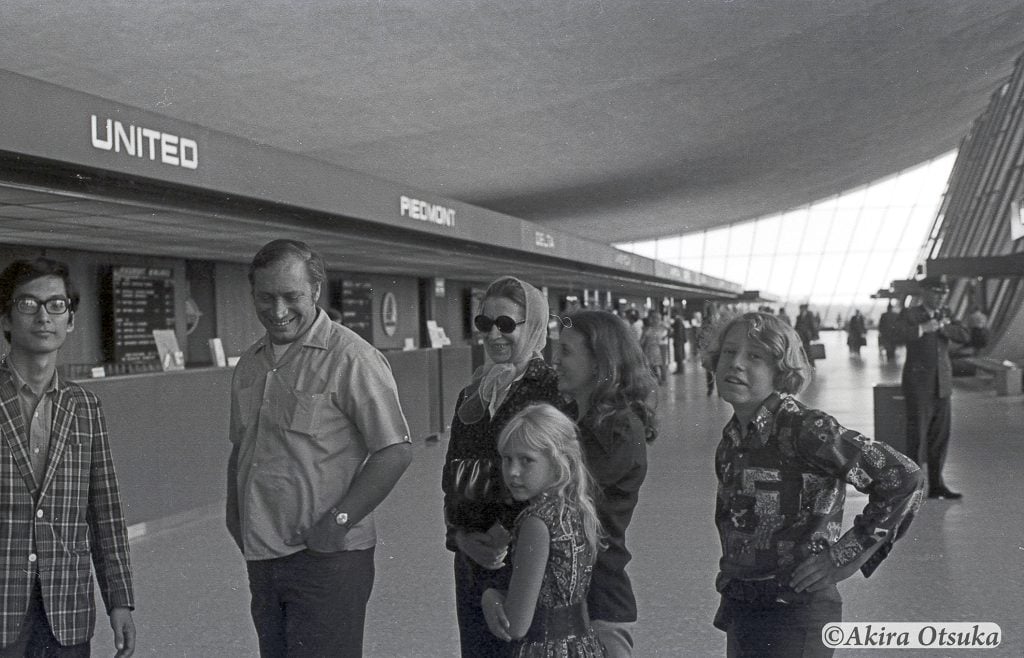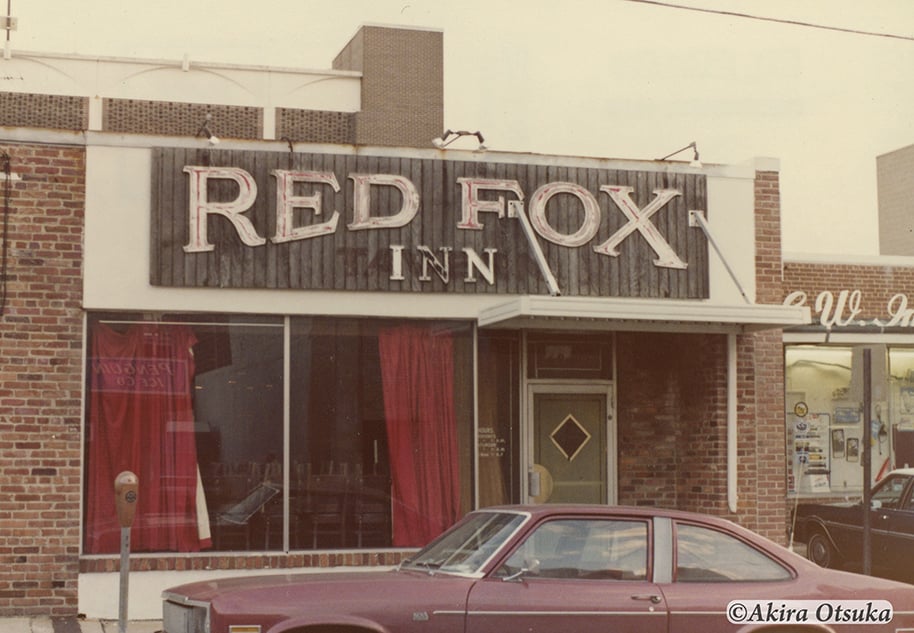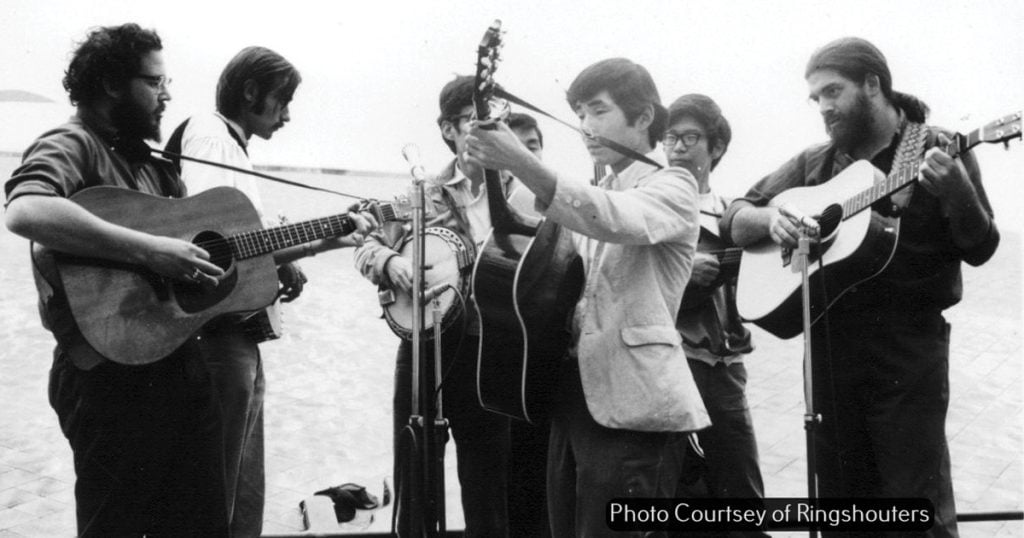Home > Articles > Special Series > Bluegrass 45: 50 Years Ago This Week – Week 14
Bluegrass 45: 50 Years Ago This Week – Week 14
This is the last in our series of sixteen articles about the historic tour that the Japanese band Bluegrass 45 took fifty years ago in the summer of 1971. In order to help us come full circle, we would like to offer some memories of that summer from legendary bluegrass banjo player Ben Eldridge, who met the band the day they arrived in the United States.

Ben writes: “In the 1971 timeframe, prior to my days with the Seldom Scene, I was a member of the band Cliff Waldron and the New Shades of Grass. Members included Cliff on guitar, Mike Auldridge on dobro, Dave Auldridge on guitar and mandolin, Ed Ferris on bass, Bill Poffenberger on fiddle, and, lastly, me on banjo. One of our early gigs was Bill Monroe’s Bean Blossom Bluegrass Festival in Indiana. Our friend—and the owner of Rebel Records—Dick Freeland, asked us if we could swing by the Indianapolis Airport on our way to the festival to pick up a young bunch of Japanese guys, known as Bluegrass 45— so we did.
“It was the six of us plus Dick Freeland picking up the five of them for the fairly lengthy remainder of the trip to the festival. Our mode of transportation was an old bread truck that Cliff had simply converted into a band bus. It was primitive, to say the least. Cliff was the driver and the rest of us were seated in the bus on very uncomfortable seats made from bread boxes. And this was back in the day when smoking was in style, so many of us were smokers, with the exception of Cliff. I remember it being a relatively quiet ride from the airport to the festival because none of us could speak Japanese and they only spoke a little English. The love of bluegrass music seemed to be the common interest that we all had and, over time, the communication between the two bands improved dramatically.
“From this time when we first met to this day, it has been a life-long friendship with the Bluegrass 45 guys, and it is so nice to have Akira Otsuka living here in the U.S., relatively close by.
“Bluegrass 45 is the reason we toured in Japan multiple times. We have so many great memories of those days, especially watching John (Duffey) elevate his voice in order to communicate with the Japanese people (thinking, I guess, that the audience would understand him better particularly since he did not know their language) and watching John and his wife, Nancy, eating a traditional Japanese dinner, that our hosts had nicely picked out for us. Watching John use chopsticks for apparently the first time and removing his shoes prior to dinner was definitely worth the extremely long plane ride from the U.S. to Tokyo and back.”
Here are Akira Otsuka’s recollections of the last week of the tour:
Conway Twitty & Loretta Lynn Tour:
I don’t have the exact dates but in September Mr. Carlton Haney hired us to open up for Conway Twitty and Loretta Lynn during their tour. It started in Philadelphia, Pennsylvania, and went to Alexandria, Virginia, then down Rt. 29 in Virginia. I can’t remember the exact cities but probably Culpepper, Charlottesville, Lynchburg and/or Danville.
According to Wikipedia: “From 1971 to 1976, Twitty received a string of Country Music Association Awards for duets with Loretta Lynn.” So when we toured with them, they had just reached to the top. People used to say Carlton made money with country shows and lost on bluegrass. I kind of saw the proof here.
I believe this happened at Watermelon Park in Berryville, Virginia the following year but Conway surprised us by dedicating a song to us, Bluegrass 45. He sang a song called “China Night” in Japanese! It is an old Japanese song that goes back to 1940’s but Kyu Sakamoto had a decent hit in US in 1963. Many older folks probably remember his #1 hit “Sukiyaki (Ueo Muite Aruko)” from the same year. I assume Conway learned “China Night” from Kyu’s version but no way to prove it now.
9/16/1971 (Thu): Red Fox Inn in Bethesda, Maryland:

For some people, it may sound strange to hear that Bluegrass 45 played at Red Fox on a Thursday night because the Seldom Scene played there (and Birchmere later) on Thursday nights for so long. But actually the Scene was born and started playing at the Red Fox about two months after this. Bill Emerson and Cliff Waldron, then later Cliff Waldron and the New Shades of Grass, used to play there before the Scene started. As matter of fact, in 1971 Mike Auldridge and Ben Eldridge were playing at the Red Fox with Cliff.
Bluegrass 45 met a Bluegrass trio, Ringshouters (Andy Wallace, Mike Rivers & Jonathan Eberhart), when they came to Osaka Expo in 1970. They were from the Washington DC area and they were entertaining people waiting in line to get into the American Pavilion. It was a popular attraction because of a moon rock and moon lander, and people had to wait in line for hours. Members of Bluegrass 45 used to stop by and jam with Ringshouters whenever we had a chance. So when we played at the Red Fox, they came to see us and even brought us sushi. Thank you, guys!
9/19/1971 (Sun) A Country Music show in Richmond
Mr. Carlton Haney asked us to play another country show, but this time it was held at a newly constructed Richmond Colosseum (capacity 13,500) in Richmond, Virginia. During the first half of Sunday afternoon show, they featured local groups and Roy Acuff closed that half. There was an intermission and the second half was Conway Twitty, Bluegrass 45 and Merle Haggard. Yes, in that order! That shows how much Mr. Haney trusted us. Yes, you can say he was crazy but for us….well, our jaws dropped when we saw the schedule and we were SCARED.
After Conway finished his set, we were ready to go on and we told sound people how we want our stage set up. However, maybe because of our poor English—or they just didn’t care—the mics were not set up correctly. A few minutes later, Mr. Haney came up behind the stage, saw how the mics were set up and asked us if it was right. Obviously he had seen us enough times during the summer. We told him what happened, then he walked onto the stage, talked to the sound crew and it was corrected in just few minutes. We went on and still couldn’t believe how big the place was. So huge that I didn’t think we connected with the audience that well but who knows— maybe people had to use the restrooms before Merle came on…..

After we sold some LPs, Dick wanted to leave because we had another show to play that night. However, we insisted we watch Merle and we won. Merle was, of course, great. I remember Ronnie Reno and Bonnie Owens were singing harmony.
As soon as Merle finished, we jumped on our bus and we were on I-95 towards Alexandria, Virginia. We were sorry Dick had to drive fast but we safely made it to Virginia Theatre (I believe that was the venue.) For many years, Dick teased us about how we were changing our clothes and shoes, running towards the backstage door and tuning our instruments at the same time. We opened for Jerry Lee Lewis that night.
Performing between Conway Twitty and Merle Haggard in front of 13,000 people, and then opening for Jerry Lee Lewis in one day—I reckon that was a pretty good day’s work for an amateur bluegrass band from Japan.
Departure:
The Freeland family saw Josh and I off at the Dulles Airport outside of Washington DC. In the picture from L to R: Josh Otsuka, Dick Freeland, Eleanor Adams (Sheila’s mother), Tami (McCarty) Freeland, Sheila Freeland and Ronnie Bucke Freeland. Josh and I flew to Los Angeles and spent a night in Montebello, California. Montebello is a sister city of Ashiya city where we were living and Josh had visited there in 1965 as an exchange student.
Epilogue:
During our US tour, people welcomed us everywhere we went with kind hospitality and bluegrass camaraderie—we appreciated that from the bottom of our hearts and we will cherish it the rest of our lives.
Josh and I reformed the group with three new members (Haruo “Bobby” Kurokawa on banjo, Kouji “Kenny” Takada on fiddle, Takao “Joe” Koba on bass) and returned to the United States in 1972. Our friend Fred Robbins captured us at the Country Gentlemen Festival in Webster, Massachusetts.
http://frobbi.org/slides/bg45/index.html
However, touring during the summer months and spending 8 months in Japan tuned to be difficult and we had to disband after the 1972 tour.
Josh got a job at a music store in Kobe but he never stopped performing. Toshio & Sab formed Bluegrass and Old-Timey Music Service (BOM) and they have been promoting bluegrass ever since. Unfortunately, Sab passed away on November 22, 2019. Liao joined Mr. Lee’s business but he has been keeping himself busy playing with many groups. Mr. Lee was an original member of Bluegrass 45, but he was studying in Taiwan in 1971 and he could not tour with us. Akira moved to US in 1973 and he has been active on stage and in studio.
There were some Japanese people who had come to the United States and attended bluegrass festivals and events before our trip in 1971. However, we were the first band and we shared our stories, experience, live tapes and photos with many friends and other musicians. In 1972, a band called It’s a Crying Time from Osaka released an album from Toshio and Sab’s Red Clay Records (named after Camp Springs mud) and made a trip to US. In 1973 Lost City Cats from Kobe also released an album and toured the States. Then Apple Seed from Tokyo in 1974, Cutting Grass in 1976, Lost City Mad Dogs, Sawoff Shotgun..… I believe Bluegrass 45 opened the floodgate.
Since 1996 Bluegrass 45 had been performing or touring on special occasions or whenever I went back to Japan. Some of festivals and venues include: IBMA World of Bluegrass in Owensboro, Kentucky (1996) and Raleigh, North Carolina (2017). Bean Blossom in Indiana (2006), ROMP in Owensboro, Kentucky (2006), Wintergrass in Bellevue, Washington (2012), Courtney Johnson Memorial Concert at Ryman in Nashville, Tennessee (1996), Birchmere in Alexandria, Viginia (1996), Birthplace of Country Music Museum in Bristol, Virginia (2017) and many more in US & Japan.
Dick Freeland moved his Rebel Records from Maryland to West Virginia in late 70’s and eventually sold it to Dave Freeman of County Records. Today Dave’s son, Mark Freeman operates Rebel as one of the top bluegrass labels from Charlottesville, Virginia. Recently Mark made all three of BG45 Rebel albums available to listen on Airplay Direct. https://airplaydirect.com/music/Bluegrass45/
In 1971, Dick Freeland’s son, Ronnie, was only 12 years old. He grew up to be one of the best bluegrass recording engineers and his long client list includes Country Gentlemen, Ralph Stanley, Seldom Scene, Hazel Dickens, Longview, Kenny Smith, Nils Lofgren, Danny Gatton, Dave Matthews Band & O.A.R. Ronnie and Akira produced Epilogue: a Tribute to John Duffey album on Smithsonian Folkways. Dick and Ronnie Freeland passed away in 2014.
Special Thanks to:
Dick, Sheila, Ronnie and Tami (McCarty) Freeland, Carlton Haney, John Miller, Fred Bartenstein, Bill Vernon, Red Shipley, Gary Henderson, Dick Cerri, Ian Tyson, John Duffey, Country Gentlemen, Cliff Waldron & the New Shades of Grass, Tex Logan, Mike Seeger, Roy Homer, Rebel Records, Kenji Nozaki, Green Jamboree and all our friends and fans both in US & Japan.
Bluegrass 45:
Tsuyoshi “Josh” Otsuka: lead vocal & guitar
Akira Otsuka: vocal & mandolin
Toshio Watanabe: bass
Saburo “Sab” Watanabe Inoue: vocal & banjo
Hsueh-Cheng Liao: vocal & fiddle
(Gakusei Ryo – pre-transliteration method)
Chien-Hua Lee: vocal & guitar
(Eika Lee – pre-transliteration method)
Share this article
2 Comments
Leave a Comment Cancel Reply
This site uses Akismet to reduce spam. Learn how your comment data is processed.


Dear Dan Miller,
I’ve read your article on Akira Asuka and noticed you left some important parts of Mr. Asuka’s music history. He played on three of my parents albums plus he performed live in many of their concerts.
My parents were very good friends of his including some of the bands you mentioned in this article. My patients band was named “Bill Rouse and The Uptown Grass Band”. We lived in the Washington DC/ Maryland area. I still do but my parents retired down south in Georgia. I’m kinda shocked in your research regarding his music history you didn’t find this.
Sincerely,
Doloros M
It’s hard to include everything in a persons history. I have included part of the liner nodes from “Waiting For The Sunrise”, which shows his involvement with Bill Rouse and The Uptown Grass Band. This is documented at both MusicBrainz and Discogs.
Bill Rouse’s distinctive uptown banjo style is easily recognized, and combined with Akira Otsuka’s versatile mandolin playing and Mark Baker’s refreshing dobro licks, it is not difficult to hear how each embellishes and complements the other to provide just the right balance for a pleasing sound. Their instrumental rendition of “The World Is Waiting For The Sunrise” and “Panhandle Rag” are unequalled in bluegrass circles. The Baker-Otsuka Rosemarie Rouse trio blends nicely in their rendition of the Hank Williams song “Mansion on the Hill”. The Bill Rouse-Rosemarie Rouse-Otsuka trio do as well on the P.D. number “Old Man at the Mill.”
Akira Otsuka came to the U.S. from Japan eleven years ago with a group called Bluegrass 45, and has made several recordings on Rebel Records. During his short stay in the U.S., he has established an excellent reputation as a versatile, inventive mandolin player. His smooth, unique style is easily recognized. Although Akira is not a regular member of the Uptown Grass Band, he has played frequently with the group for the past four years. His performance on this record is a definite asset to the group.